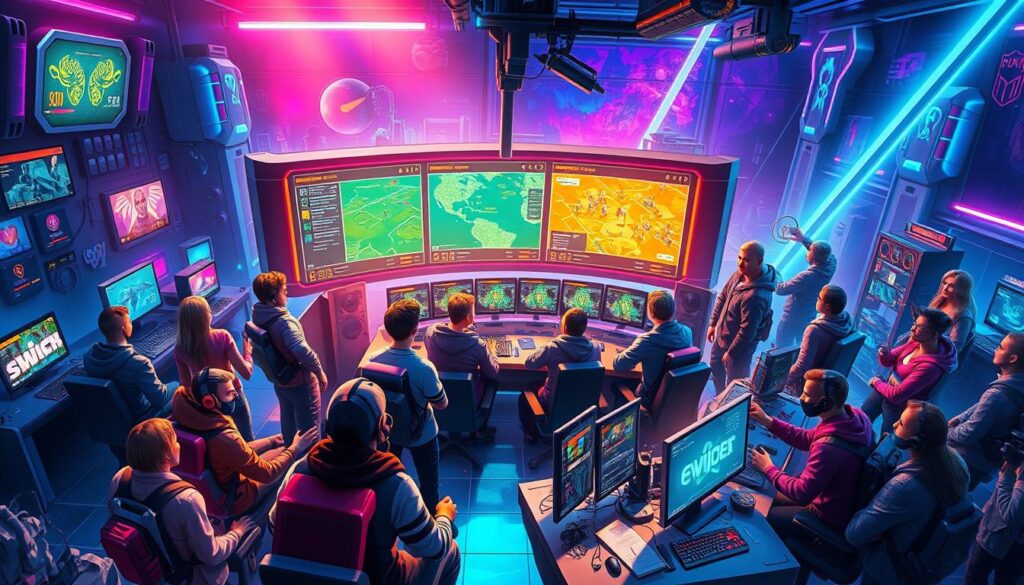Gaming Clans and Guilds
In the world of online gaming, virtual teams have become a cornerstone of the multiplayer experience. These groups, known as gaming clans and guilds, are more than just casual gatherings. They’re the backbone of online gaming communities, fostering teamwork and competitive play across various esports organizations.
Anúncios
As multiplayer games have evolved, so too have these digital collectives. From humble beginnings in early text-based games to today’s complex structures in massive online worlds, gaming clans have grown alongside the industry. They offer players a sense of belonging and purpose in vast virtual landscapes.
Whether you’re storming castles in fantasy realms or planning tactical assaults in futuristic battlefields, these groups provide a framework for shared experiences. They transform solo gaming into a social adventure, where friendships are forged and skills are honed through collaboration.
Key Takeaways
- Gaming clans and guilds are essential to online gaming communities
- Virtual teams enhance multiplayer game experiences
- Clans foster teamwork and competitive play
- These groups have evolved with the growth of online gaming
- Esports organizations often have roots in gaming clans
- Clans provide a social structure in digital environments
Understanding Gaming Clans and Guilds: A Modern Gaming Phenomenon
Gaming clans and guilds have become integral to the video game culture, shaping online team dynamics and fostering vibrant gaming communities. These organizations bring players together, creating a sense of belonging in virtual worlds.
What Defines a Gaming Clan
A clan definition typically includes a group of gamers who unite under a common banner. Clans often share goals, strategies, and a unique identity within their chosen game. They range from casual groups to highly organized competitive teams.
The Evolution of Online Gaming Communities
Online gaming communities have transformed significantly over the years. From early text-based games to modern multiplayer experiences, the guild structure has adapted to meet players’ social and competitive needs. Today’s gaming groups utilize advanced communication tools and management systems to coordinate their activities.
Different Types of Gaming Organizations
Gaming community types vary widely, catering to diverse player preferences:
- Casual social groups for relaxed gameplay
- Competitive clans focused on tournaments
- Role-playing guilds in MMORPGs
- Content creation teams for streaming and videos
| Organization Type | Focus | Typical Activities |
|---|---|---|
| Casual Clan | Social interaction | Game nights, chat sessions |
| Competitive Team | Skill improvement | Practice matches, tournaments |
| MMORPG Guild | In-game progression | Raids, quests, resource sharing |
| Content Creators | Entertainment | Streaming, video production |
Each type of gaming organization offers unique experiences, contributing to the rich tapestry of online gaming culture. Understanding these structures helps players find their ideal community within the vast digital landscape.
The Benefits of Joining Gaming Communities
Gaming communities offer a wealth of advantages for players. These groups create spaces where gamers can connect, grow, and thrive together. Let’s explore the key benefits of joining these digital collectives.
Social Connections and Friendships
Gaming friendships form the heart of these communities. Players bond over shared interests, tackle challenges together, and create lasting relationships. Many gamers report that their closest friends come from online gaming circles.
Skill Development and Learning
Skill improvement is a natural outcome of community participation. Experienced players often mentor newcomers, sharing strategies and tips. This collaborative environment fosters rapid growth and mastery of game mechanics.
Access to Resources and Support
Community support is a cornerstone of gaming groups. Members share guides, walkthrough videos, and custom tools to enhance gameplay. This collective knowledge base proves invaluable for overcoming tough game sections or mastering complex strategies.
| Benefit | Impact |
|---|---|
| Gaming Friendships | Long-lasting social connections |
| Skill Improvement | Faster learning and game mastery |
| Community Support | Access to shared resources and knowledge |
| Team Benefits | Enhanced coordination and strategic play |
The team benefits of gaming communities extend beyond individual growth. Coordinated play leads to better performance in multiplayer games. Players learn to communicate effectively, strategize as a unit, and support each other’s roles, resulting in a more rewarding gaming experience overall.
Community and Multiplayer: The Core of Modern Gaming
Gaming has evolved far beyond solo adventures. Today, multiplayer experiences form the heart of modern gaming. Players worldwide connect, compete, and collaborate in virtual realms, forging friendships and rivalries alike.
Cooperative gameplay stands out as a key element in many popular titles. Games like “Destiny 2” and “Overwatch” encourage players to work together, tackling challenges that would be impossible alone. This teamwork not only enhances the gaming experience but also builds lasting connections among players.
Team-based games have surged in popularity, with esports titles leading the charge. “League of Legends” and “Counter-Strike: Global Offensive” draw millions of players into intense competitive matches. These games foster a sense of camaraderie and shared purpose among teammates.
Social gaming extends beyond just playing together. Platforms like Twitch and Discord have created spaces for gamers to chat, share strategies, and build communities around their favorite titles. This social aspect has become integral to the gaming experience for many.
| Game Type | Popular Examples | Key Features |
|---|---|---|
| Cooperative | Destiny 2, Sea of Thieves | Shared objectives, teamwork |
| Competitive | DOTA 2, Rocket League | Ranked matches, tournaments |
| Social | Among Us, Fall Guys | Party-style gameplay, easy to learn |
The rise of multiplayer gaming has transformed the industry. Game developers now prioritize social features and community-building tools, recognizing their importance in player retention and engagement. As technology advances, we can expect even more immersive and interconnected gaming experiences in the future.
Building and Managing a Successful Gaming Clan
Creating a thriving gaming clan takes more than just gathering players. It requires careful planning and effective clan management. Let’s dive into the key elements that make a gaming clan successful.
Leadership Structure and Roles
A strong leadership structure is crucial for clan success. Define clear leadership roles to ensure smooth operations. Here’s a simple hierarchy many clans follow:
- Clan Leader: Makes final decisions and sets overall direction
- Officers: Handle day-to-day management and support the leader
- Senior Members: Mentor newer players and help with recruitment
- Regular Members: Participate in clan activities and represent the clan
Recruitment Strategies
Effective member recruitment is vital for clan growth. Consider these strategies:
- Use social media to showcase your clan’s achievements
- Host open events to attract potential members
- Encourage current members to invite friends
- Participate in community forums and discussions
Community Guidelines and Rules
Establish clear guidelines to maintain a positive environment. Your rules should cover:
- Behavior expectations
- Activity requirements
- Communication protocols
- Conflict resolution processes
Event Planning and Activities
Regular community events keep members engaged and foster team spirit. Plan a mix of activities such as:
| Event Type | Description | Frequency |
|---|---|---|
| Training Sessions | Skill improvement workshops | Weekly |
| Tournaments | Inter-clan or internal competitions | Monthly |
| Social Gatherings | Non-gaming activities for bonding | Bi-monthly |
| Charity Streams | Fundraising events for good causes | Quarterly |

By focusing on these key areas, you’ll be well on your way to building a successful and lasting gaming clan. Remember, consistent effort in leadership, recruitment, and community engagement is the secret to long-term clan growth and success.
Popular Games and Their Clan Systems
Gaming communities come in various forms across different genres. From MMORPG guilds to esports teams, each game type has its unique clan structure. Let’s explore how these systems work in popular games.
MMORPGs and Guild Structures
In massively multiplayer online role-playing games, guilds form the backbone of player interactions. World of Warcraft, a prime example, features intricate guild systems. Players band together, share resources, and tackle challenging raids.
Competitive Gaming Teams
Esports teams represent the pinnacle of organized gaming. Games like Counter-Strike: Global Offensive showcase highly structured team environments. These groups practice rigorously, develop strategies, and compete in tournaments for fame and fortune.
Casual Gaming Groups
Casual gaming clans offer a more relaxed community experience. Fortnite, with its diverse player base, hosts numerous casual groups. These clans focus on fun, socializing, and improving skills without the pressure of professional competition.
| Game Type | Community Structure | Focus |
|---|---|---|
| MMORPGs | Guilds | Cooperation, Resource Sharing |
| Competitive | Esports Teams | Skill Development, Tournaments |
| Casual | Gaming Clans | Social Interaction, Fun |
Game-specific communities thrive across all genres, each with unique features tailored to their game’s mechanics and player base. Whether you’re into intense competition or casual play, there’s a gaming clan out there for you.
Tools and Platforms for Clan Management
Gaming clans need effective tools to stay organized and connected. Modern gaming communication tools offer robust features for clan management and teamwork. Let’s explore some essential platforms that help clans thrive in the digital gaming world.
Discord: The Gamer’s Communication Hub
Discord has become the go-to platform for gamers. It offers voice chat, text channels, and screen sharing. Clans use Discord to coordinate strategies, share updates, and build community. Its integration with games makes it a powerful tool for clan communication.

Specialized Clan Management Software
Dedicated clan management platforms provide features tailored for gaming groups. These tools often include:
- Member databases
- Event scheduling
- Performance tracking
- Recruitment systems
Popular options like Guilded and Gamerlink offer comprehensive solutions for clan leaders to manage their teams efficiently.
Leveraging Social Media for Gamers
Social media platforms play a crucial role in clan growth and engagement. Clans use Twitter, Facebook, and Instagram to:
- Share highlights and achievements
- Recruit new members
- Engage with the broader gaming community
Platforms like Twitch and YouTube allow clans to stream gameplay and create content, boosting their visibility in the gaming world.
| Platform Type | Key Features | Benefits for Clans |
|---|---|---|
| Discord | Voice chat, text channels, screen sharing | Real-time communication, community building |
| Clan Management Software | Member databases, event scheduling, performance tracking | Organized management, data-driven decision making |
| Social Media | Content sharing, streaming, networking | Brand building, recruitment, fan engagement |
Conclusion
Gaming clans and guilds have become a cornerstone of modern gaming culture, shaping player experiences and fostering social connections. These communities have transformed solitary gaming into vibrant social hubs, where players collaborate, compete, and grow together. As evolving multiplayer experiences continue to push boundaries, the future of gaming communities looks brighter than ever.
The impact of these online groups extends far beyond the virtual world. They’ve created lasting friendships, improved players’ skills, and even launched professional gaming careers. With the rise of social gaming trends, we’re seeing a shift towards more inclusive and diverse communities that welcome players from all walks of life.
Looking ahead, the gaming industry is poised for exciting developments in community-driven experiences. As technology advances, we can expect to see more immersive and interconnected gaming worlds that blur the lines between reality and virtual spaces. The future of gaming communities will likely involve enhanced cross-platform integration, virtual reality meetups, and AI-powered clan management tools.
In this ever-evolving landscape, one thing remains clear: the power of connection in gaming is here to stay. As we embrace new technologies and social gaming trends, the bonds formed within these digital communities will continue to enrich our gaming experiences and shape the industry for years to come.
